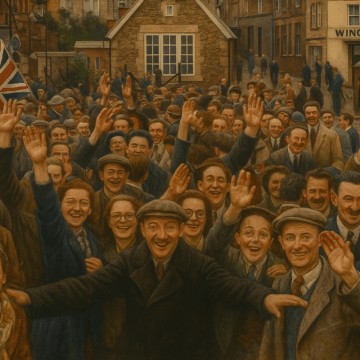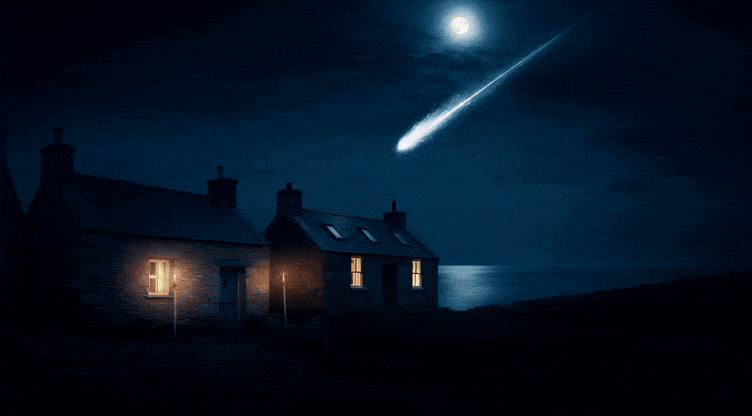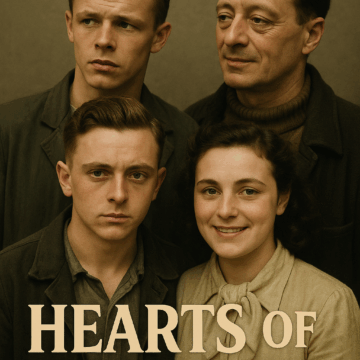Churchill Turned His Back
A song of sorrow, survival, and Guernsey’s wartime memory
The summer came in ’40, the storm was drawing near,
We looked across the Channel, but no help appeared!
Churchill made his mind up, the papers sealed the fact,
He left us to the jackboots — yes, he turned his back!
Churchill turned his back on us, left us to the foe,
Guernsey cried for England, but England let us go!
The swastikas came flying, the Union Jack came down,
We were left to face the darkness while he toasted London Town!
They called it “demilitarised,” a coward’s tidy phrase,
But it meant the Black Cross banner would fly for endless days!
No Spitfires in the heavens, no rifles on the sand,
Just silence as the islands fell to Hitler’s hand!
Churchill turned his back on us, left us to the foe,
Guernsey cried for England, but England let us go!
The swastikas came flying, the Union Jack came down,
We were left to face the darkness while he toasted London Town!
Left us hungry! (Shame, shame, shame!)
Left us broken! (Name, name, name!)
While he roared in Parliament, puffing on his smoke,
The Channel Isles were shackled — it’s no bloody joke!
Churchill turned his back on us, left us to the foe,
Guernsey cried for England, but England let us go!
The swastikas came flying, the Union Jack came down,
But still we kept our spirit till Liberation crowned!
Never forget — HE LEFT US!
Churchill Turned His Back on Us: Memory, Music, and the Abandonment of Guernsey
Songs often preserve emotions that history books reduce to footnotes. The verses of “Churchill Turned His Back on Us” express the anguish of Guernsey’s people in the summer of 1940, when the Channel Islands were left exposed to Nazi occupation.
The Summer of 1940
In June 1940, France collapsed under German attack. The Channel Islands, just 30 miles off the French coast, suddenly stood as the most vulnerable part of the British Isles. Military leaders quickly judged them indefensible: too small to defend, too close to enemy lines, and lacking natural protection. On 15 June, the British government declared Guernsey and Jersey “demilitarised.”
“We heard it on the wireless — ‘demilitarised.’ It meant we were naked before the Germans. My father said, ‘England has washed her hands of us.’”
Evacuation followed in haste. Around 17,000 Guernsey residents — nearly half the population — left for England, many children travelling without parents.
“They took my boy on the boat, and I had to stay behind. I promised him I’d follow, but I never did. For five years, I had no word.”
On 28 June 1940, German aircraft bombed St Peter Port harbour, killing 33 civilians. Two days later, German troops landed unopposed. The swastika was hoisted above the harbourmaster’s office; the Union Jack was gone.
Churchill’s Decision
Winston Churchill is remembered globally as the bulldog of resistance, but to Guernsey he was the man who “turned his back.” His Cabinet decided that holding the islands would drain resources needed for mainland defence.
“They [the Channel Islands] were of no strategic value. It was impossible to justify the loss of troops and aircraft to defend them.”
For the people left behind, this reasoning was cold comfort. The song’s chorus captures the bitterness:
Churchill turned his back on us, left us to the foe,
Guernsey cried for England, but England let us go!
Survival and Liberation
Yet the final verse of the song reminds us that occupation was not the end. Islanders resisted in small but powerful ways — listening to secret radios, sheltering escaped prisoners, refusing to bow to Nazi propaganda.
“We saw the Tommies coming off the boat, and we screamed until our throats hurt. We were free — at last!”
Churchill himself, addressing Parliament, admitted the weight of those five years:
“The Channel Islands, the only British soil occupied by the enemy, have been freed from the foulest oppression.”
Why This Song Matters
This song is not just a protest; it is part of Guernsey’s living memory. It challenges the heroic image of Churchill by telling the story from the islands’ perspective. Historians may defend his decision as militarily unavoidable, but the emotional truth remains: islanders felt abandoned.
By giving voice to that grief and outrage, the song ensures that the scars of 1940 are not forgotten. It also testifies to resilience — that even under the swastika, Guernsey’s spirit endured until Liberation.
Discover more from Guernsey Deep Dive
Subscribe to get the latest posts sent to your email.






